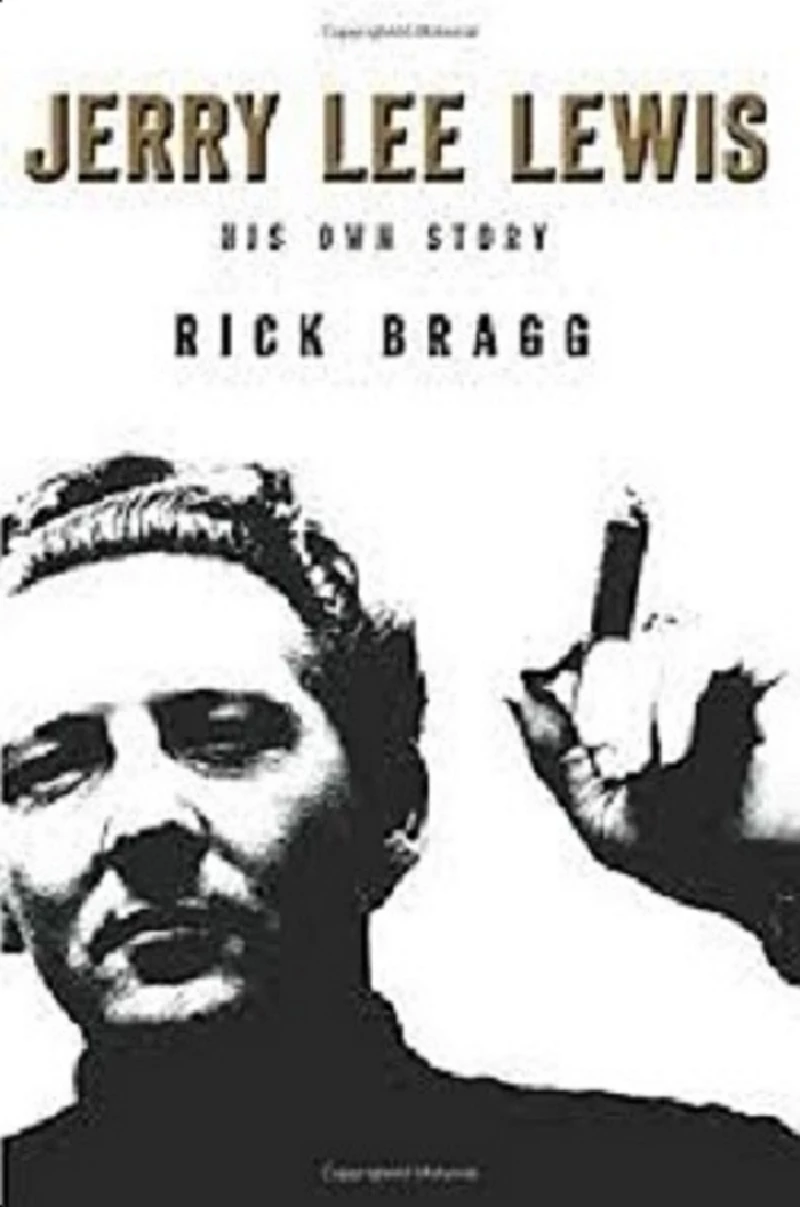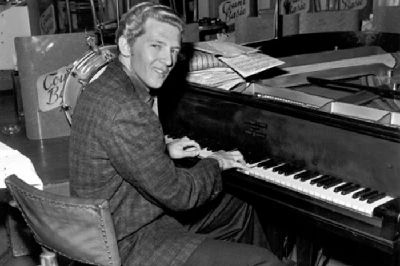Jerry Lee Lewis - Jerry Lee Lewis: His Own Story
by Lisa Torem
published: 12 / 4 / 2015

intro
In 'Raging Pages', her regular monthly book column, Lisa Torem reflects on Jerry Lee Lewis' new memoir, which has been written by award-winning journalist, Rick Bragg
This book is a class act. The journey begins with the black and white cover photo, which is set against a glossy white background, of Jerry Lee Lewis in a black turtleneck, gripping a cigar snugly between the fingers of a raised hand. The shot features a handsome man with a slicked back head of waves and a look of wisdom and contentment on his face, which could also be construed as arrogance. You don’t know exactly what he was thinking at the time it was snapped, but you feel like he’s come to life all the same — it’s the feeling you get when you first see the Mona Lisa; you’ve heard about the masterpiece all your life, but it is only in its presence that you understand what the fuss is all about. Rick Bragg did extensive research to pull off this nearly 500-page memoir. There is lots of exposition, which at first glance seems weighty, but as the story unfolds it makes perfect sense — the rock star’s roots and future ambitions were steeped in his family’s rural beginnings and what would become the family’s hard knock legacy and loss. “Jerry Lee’s sister, Frankie Jean, tells of a day the rains beat down, the rivers rose, and the swelling groundwater shoved the dead from the mud.” His sibling is referencing Concordia Parish, Louisiana. Just dealing with the elements: water moccasins, rising tides and vulnerable crops not to mention abject poverty forced youngsters like Jerry to grow up fast. His father, Elmo Kidd Lewis, literally threw him from a boat to teach him to swim — his cries of help met with impatience, but “outstretched arms.” Still, Jerry Lee thrived. “If you’re ashamed of where you’re from, then you’re ashamed of yourself,” he recalls, musing about Ferriday, Louisiana. Jerry Lee’s stamina, confidence and grit become leit motifs through out this engaging story. Jerry Lee’s grandfather, Leroy, was a fiddler turned farmer. Elmo “was one of eleven children.” He “…could look at a machine and tell you how its pieces fit.” When asked about his father, Jerry Lee claimed that “he never lost no fights.” Jerry Lee’s own dare devil attitude manifested itself in other ways: hanging fearlessly from the local bridge or running across the railroad tracks, dodging a speeding train. Fortunately, he would forge his ultimate identity with a safer option, which came about in 1940 when five-year-old Jerry Lee cultivated his own sense of purpose at his Aunt Stella’s house, coming face to face with a piano. His love for this instrument was so strong that later on he would sneak into a popular honky tonk operated by a black owner. The fact that he’d be thrown out by the scruff of his neck night after night didn’t daunt him one bit. It just made his resolve stronger. He would reflect back: “I was born to be on a stage.” In the summer of 1949, he entertained his first audience with a Stick McGhee tune and “he walked on the clouds” after counting out the nearly fourteen dollars he’d made passing the hat. By thirteen, he was talking club owners into letting him perform and establishing a name for himself. He’d move on to Storyville and Bourbon Street, demanding participation from drunk patrons. He’d gravitate to the fury of church ministers, ignoring their dogma, but imitating their fervour in his aggressive onstage act. Eventually, he’d land a record deal with Sam Phillips at Sun Records, Memphis, where he’d lock horns yet intimately get to know his chief competitor Elvis Presley. The book details the many reasons Jerry Lee suffered a series of failed marriages. When a movie was done of his life, 'Great Balls of Fire', he wondered why it only mentioned his marriage to his young cousin Myra; that was the union which created a scandal in England and immediately set back his then untouchable career path. There are stories that music fans will relish; road stories that tell about his run ins with luminaries like Chuck Berry or emotional debates about the devil and the church with Phillips. Jerry Lee comes across as a truthful, often violent man, who readily admits to past mistakes, yet prides himself in forever picking himself up again despite severe grief — he loses close family members — and dramatic career peaks and valleys. As the author implies, you may not always like Jerry Lee Lewis, but you’ll be fascinated by his determination, natural gifts and unique personality. The book is well-researched, packed with astute cultural insights and includes two creative sections of archival photographs, some drawn from the rock star’s personal collection.
Also In Raging Pages
Alice Cooper (2015)
Beatles (2022)
Benjamin Orr (2018)
Bernard Purdie (2015)
Billy Bragg (2017)
Billy J. Kramer (2016)
Bob Boilen (2016)
Bob Dylan (2018)
Bob Marley (2019)
Brian Wilson (2017)
Byrds (2024)
Carl Ewens (2025)
Cher (2025)
Clive Davis (2015)
Common (2020)
Damned (2021)
Don Short (2020)
Donovan (2022)
Elliott Murphy (2019)
Elvis Costello (2015)
Felix Cavaliere (2022)
Flip Side (2025)
Frank Sinatra (2023)
Frank Zappa (2017)
Gary Wright (2014)
Gene Simmons (2015)
Geoff Emerick (2018)
George Harrison (2022)
Graham Nash (2023)
Green Day (2019)
Holger Czukay (2025)
Ian Mclagan (2016)
Iron Maiden (2014)
Jann Wenner (2019)
Jerry Nolan (2018)
Jim Summaria and Mark Plotnick (2019)
Jimmy Webb (2022)
Joe Perry (Aerosmith) (2014)
John Lennon (2017)
Kinks (2014)
Lani Hall Alpert (2019)
Laurence Juber (2014)
Liberty DeVitto (2021)
Lisa Robinson (2021)
Lita Ford (2021)
Little Anthony (2014)
Louise Harrison (2015)
Luke Haines (2024)
Manic Street Preachers (2017)
Mary Wilson (2021)
Michael Bloomfield (2020)
Michael Dorf (2019)
Miscellaneous (2014)
Ozzy Osbourne (2014)
Pamela Des Barres (2017)
Paul McCartney (2020)
Radiohead (2022)
Renee Rosen (2018)
Richard Balls (2018)
Rick Wakeman (2023)
Ringo Starr (2015)
Robby Krieger Band (2022)
Roger Daltrey (2020)
Rolling Stones (2016)
Ronnie Wood (2015)
Roy Bond (2023)
Sam Phillips (2018)
Sean Madigan Hoen (2014)
Silas House (2020)
Spencer Vignes (2017)
Spirit (2023)
Suzi Quatro (2023)
Sylvain Sylvain (2018)
Thin Lizzy (2016)
Tommy James (2021)
Tommy Mottola (2025)
Tori Amos (2020)
U2 (2021)
Who (2014)
Will Romano (2015)
Woody Woodmansey (2018)
Zz Top (2014)
profiles |
|
Jerry Lee Lewis (2012) |

|
| With a new four CD compilation 'A Whole Lotta Jerry Lee' about to be released, Cila Warncke reflects on the career of the legendary Jerry Lee Lewis |
most viewed articles
current edition
Carl Ewens - David Bowie 1964 to 1982 On Track: Every Album, Every SongArmory Show - Interview with Richard Jobson
Bathers - Photoscapes 1
Colin Blunstone - Thalia Hall, Chicago, 16/7/2025
Visor Fest - Valencia, Spain, 26/9/2025...27/9/2025
Billie Eilish - O2 Arena, London, 10/7/2025
Robert Forster - Interview
Loft - Interview
John McKay - Interview
Editorial - July 2025
previous editions
Heavenly - P.U.N.K. Girl EPManic Street Preachers - (Gig of a Lifetime) Millennium Stadium, Cardiff, December 1999
Oasis - Oasis, Earl's Court, London, 1995
Beautiful South - Ten Songs That Made Me Love...
Trudie Myerscough-Harris - Interview
Pixies - Ten Songs That Made Me Love...
Simon Heavisides - Destiny Stopped Screaming: The Life and Times of Adrian Borland
Paul Clerehugh - Interview
Doris Brendel - Interview
Prolapse - Interview
most viewed reviews
current edition
Amy Macdonald - Is This What You've Been Waiting For?Sick Man of Europe - The Sick Man of Europe
Alice Cooper - The Revenge of Alice Cooper
Phew, Erika Kobayashi,, Dieter Moebius - Radium Girls
Davey Woodward - Mumbo in the Jumbo
Lucy Spraggan - Other Sides of the Moon
Blueboy - 2
Cynthia Erivo - I Forgive You
Philip Jeays - Victoria
Lapsley - I'm a Hurricane, I'm a Woman In Love
Pennyblackmusic Regular Contributors
Adrian Janes
Amanda J. Window
Andrew Twambley
Anthony Dhanendran
Benjamin Howarth
Cila Warncke
Daniel Cressey
Darren Aston
Dastardly
Dave Goodwin
Denzil Watson
Dominic B. Simpson
Eoghan Lyng
Fiona Hutchings
Harry Sherriff
Helen Tipping
Jamie Rowland
John Clarkson
Julie Cruickshank
Kimberly Bright
Lisa Torem
Maarten Schiethart